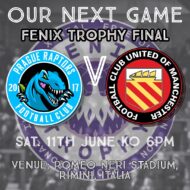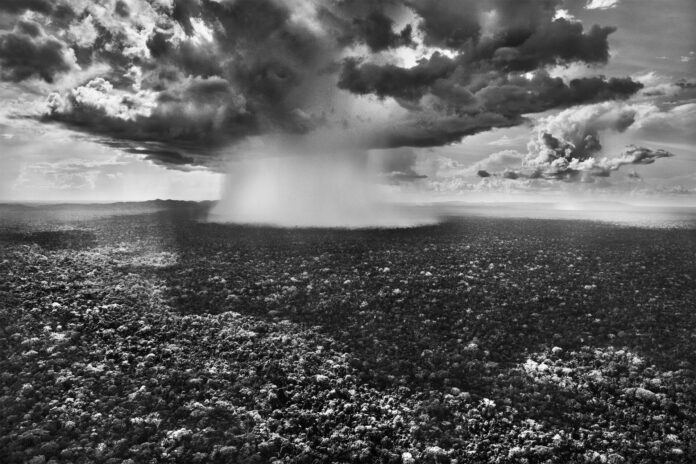In a dark corner of the Science & Industry Museum’s new underground gallery is a vision of the end of the world. With the wall to your left walk straight ahead from the entrance until you reach it: a black and white print about four feet by six feet across, one of the many dozens hanging in the dusk of the subterranean space. What the eye sees is an atomic bomb blast – that uprushing spew of light which the brain perceives as a mushroom cloud – but that’s not what it is. What it is, is a photograph of a raincloud exploding over the Amazon forest. When that cloud disappears – when the unique weather systems governing the forest-continent’s ecology are finally undone – so will we.
“You know your own skies in Manchester are very beautiful,” says the photographer, Sebastião Salgado, standing beside me. “I was walking by the canals. The volume, the light…they are very special here.”
Volume is one thing, of course, imagery another. More than any art form photography is contingent on its subject matter – what you choose to depict has great bearing on the quality of the work. In this way Salgado may be reckoned as one of the greatest practitioners in the history of the medium. Having made his name in the 1980s with Dantean images of

the Serra Pelada goldmine – hellish visions of near-naked men in their thousands hauling the precious metal out of a hole in the ground – he has continued to make art which evokes both the high mind of the Renaissance and the vitality of the modern era. “’Sometimes people tell me that ‘you are photo-reporter’” he tells me. “But it’s none of this. Photography is my life.”
Around us the room is filled with otherworldly glimpses of the forest and the people who live there: apocalyptic vistas, portraits of indigenous peoples. It’s difficult to credit that photography can be this good. “We don’t know our own world,” says Salgado, and you don’t need to be Charles Darwin to see how this applies most specifically to Amazonia. The size of it. The remoteness of it. The otherness of it. The fact that it’s keeping us alive – bigger than Europe, less familiar to us than the moon. The fact that there are hundreds of thousands of people there who have never been contacted by human civilization, and hundreds of thousands more who are barely in touch. Scores of tribes, scores of languages, all under threat.
We threaten ourselves, of course. “Humanity, our species…there is no future for us,” says Salgado. “We are predators. The way we are doing, we will disappear soon. And the planet…the planet will reboot itself and move on.”
Seasick yet still docked
At a bustling Prestwich café bar Lara Williams takes a breather from the repetitive strains of mothering and and marking to think for a fleeting momeent about her writing career. Two years ago her novel Supper Club – a feminist Fight Club, the critics called it, about a gang of women who declare war on society by holding illicit Bacchanalian eating parties – won The Guardian’s Not The Booker Prize, tipping her headlong into the world of the published counter-culturalist. “I wanted to write a transgressive novel,” she says of the augmented fifth she struck with readers. “A lot of the fiction I grew up with was stuff like American Psycho, which transgresses through the female body but from a male perspective. What I wanted to do was female transgression but through the eyes of a woman.”
Perhaps somewhere in the world of follow-up novel The Odyssey is to be found a trapdoor in Williams new life as a parent and MMU creative writing lecturer. The oceans have risen, the coastlands crumbled and the ravages of late capitalism abound. With the workplace eclipsing the home as the centre of human activity, and the cruise ship superseding the beach as the locus of the vacationary dream, uncertain Ingrid finds herself grafting the gig economy aboard an oceangoing mall run like a cultish Silicon Valley  corporation…strangely grounded at sea while adrift and unmoored during brief forays ashore.
corporation…strangely grounded at sea while adrift and unmoored during brief forays ashore.
“Every time I’ve published a book it’s like a deep sense of underwhelm, but this time I’m so busy I don’t even have think about it unless I’m made to,” she says. Responses to the new one, when she has been able to check in with the books scene, have been more perplexed. “The Times reviewer was at great pains to stress that it’s very different to Sally Rooney…” There’s a pause. “Of course it’s different to Sally Rooney. It’s absurdist speculative fiction.”
What it’s also different to is that shorthaired breed of shaggy dog tale commonly commonly taxonomised under ‘the uncanny’ which has been pouring out of the writing schools for some time now. With its leaner sentences and finer carpentry Williams tells me it’s the work which has given her the greatest pride, even as she strives to nail a personal brand of writeriness that will sustain a career. “I wanted to write about a cruise ship because they involve a hyperarticulation of ‘place’” she says, and you can hear the writing school speaking through her. “Now, I’m trying to write a pregnancy body-horror,” she continues, visibly returning to herself.
Pariahed of all Europe
From pitch-side at Broadhurst Park the future looks shades-worthy for FC United manager Neil Reynolds. “Yes, the only Manchester club left in Europe!” he grins. This weekend, his tier seven minnows face Czech semipros Prague Raptors in the final of the Fenix Trophy – the curious European competition for non-league football clubs from towns specifically served by budget airlines. With an army of some five hundred fans expected to make the trip out to Rimini to watch the match, it spells a return to limelight for the Moston-based Rebels after a quiet few years. “Yes, it’s put us back on the map,” says Reynolds. “The media attention, the friends we’re making, the money it’s generated, the buzz around the club. Of course, there will always be people who criticise…”
Well, yes. Some might argue that a continental tournament for semi-professional sides poses questions about priorities in the grassroots game, not to mention the carbon footprints we’re being warmly encouraged to drop down a few sizes. Neil, is it not that FC United just can’t help  being Non-League Billy Bigtimes? Can’t you just knuckle down to the noble traditions of the muck-and-nettles game?
being Non-League Billy Bigtimes? Can’t you just knuckle down to the noble traditions of the muck-and-nettles game?
“It’s a great argument, isn’t it?” – at some point, one suspects, the former secondary school headteacher has shone on a media training day – “Somebody said to me, has Europe been a distraction? Well, the reason we’ve entered a competition like this is because of the wonderful fanbase we have. It’s a celebration of fan-owned football.”
Less keen to pile in with the felicitations have been the Rebels’ adversaries in the Northern Premier League Premier Division, this season, whom the manager has more than once found to have been using it as a motivating factor against his men. It isn’t difficult to picture top brass at Timperley Bigshorts – or indeed the assistant manager at Matlock Town – getting in a pre-match lather over their opponents’ upcoming crunch tie in Milan. For the little club founded on Manchester United-sized dreams, lifelong suppers at the teat which nursed Matt Busby’s pioneering forays in the European cup, it’s quite easy to look like Mancunian boosterists gone mad.
Reynolds and his men will care little of that this weekend if they lift the inaugural trophy. After a brutal civil war which rocked the supporter-owned club a few years back, board chair Adrian Seddon has made strides in stabilizing the breakaway club. A sports ad salesman who attends events across the continent, Seddon has been instrumental in making the Fenix project fly. “This is all very much a tribute to him,” says Reynolds. “If we can improve one thing as a football club it’s basic communication, getting the message out, repairing relationships, why we’re in Europe and so on. We’re the biggest fan-owned football club in the country. We’re spreading the word.”
@dannyxmoran








